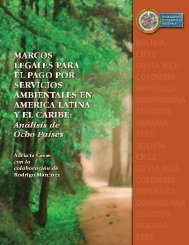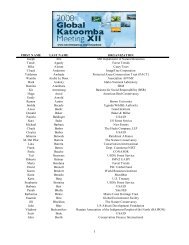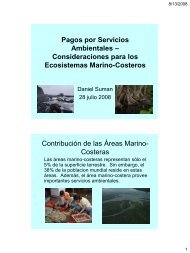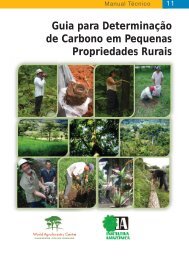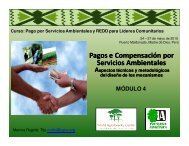esource rights, as well asits use <strong>and</strong> management,is an underlying cause ofbiodiversity loss am<strong>on</strong>gindigenous peoples.• In the Anchorage Declarati<strong>on</strong>of the <strong>Indigenous</strong><strong>Peoples</strong>’ Global Summit<strong>on</strong> <strong>Climate</strong> <strong>Change</strong> heldin April 2009, indigenouspeoples reiterated thatthe “rights of <strong>Indigenous</strong><strong>Peoples</strong>, affirmed by theUNDRIP, must be fullyrespected in all decisi<strong>on</strong>makingprocesses <strong>and</strong>activities related to climatechange. This includes our rightsWhat is FPIC?(c<strong>on</strong>tinued)affected indigenous people(s) retain the rightto refuse c<strong>on</strong>sent or to withhold c<strong>on</strong>sentuntil certain c<strong>on</strong>diti<strong>on</strong>s are met. C<strong>on</strong>sentmust be obtained without coerci<strong>on</strong>, prior tocommencement of activities, <strong>and</strong> after theproject prop<strong>on</strong>ent’s full disclosure of theintent <strong>and</strong> scope of the activity, in language<strong>and</strong> process underst<strong>and</strong>able to the affectedindigenous peoples <strong>and</strong> communities.Source: <strong>Indigenous</strong> <strong>Peoples</strong>’ Right to Free, Prior <strong>and</strong>Informed C<strong>on</strong>sent <strong>and</strong> the World Bank’s ExtractiveIndustries Review by Fergus MacKay, Forest <strong>Peoples</strong>’Programme, 2004.to our l<strong>and</strong>s, territories, envir<strong>on</strong>ment <strong>and</strong> natural resources as c<strong>on</strong>tainedin Articles 25–30 of the UNDRIP. When specific programs <strong>and</strong> projectsaffect them, the right to Self Determinati<strong>on</strong> of <strong>Indigenous</strong> <strong>Peoples</strong> mustbe respected, emphasizing our right to Free Prior <strong>and</strong> Informed C<strong>on</strong>sentincluding the right to say ‘no.’ UNFCCC agreements <strong>and</strong> principles mustreflect the spirit of the UNDRIP.”UNDRIP’s Articles <strong>on</strong> Traditi<strong>on</strong>al L<strong>and</strong>s,Resources <strong>and</strong> TerritoriesArticle 25<strong>Indigenous</strong> peoples have the right to maintain <strong>and</strong> strengthen their distinctivespiritual relati<strong>on</strong>ship with their traditi<strong>on</strong>ally owned or otherwise occupied<strong>and</strong> used l<strong>and</strong>s, territories, waters <strong>and</strong> coastal seas <strong>and</strong> other resources <strong>and</strong> touphold their resp<strong>on</strong>sibilities to future generati<strong>on</strong>s in this regard.Article 261. <strong>Indigenous</strong> peoples have the right to the l<strong>and</strong>s, territories <strong>and</strong> resourceswhich they have traditi<strong>on</strong>ally owned, occupied or otherwise used or acquired.2. <strong>Indigenous</strong> peoples have the right to own, use, develop <strong>and</strong> c<strong>on</strong>trol the l<strong>and</strong>s,territories <strong>and</strong> resources that they possess by reas<strong>on</strong> of traditi<strong>on</strong>al ownershipor other traditi<strong>on</strong>al occupati<strong>on</strong> or use, as well as those which they haveotherwise acquired.3. States shall give legal recogniti<strong>on</strong> <strong>and</strong> protecti<strong>on</strong> to these l<strong>and</strong>s, territories<strong>and</strong> resources. Such recogniti<strong>on</strong> shall be c<strong>on</strong>ducted with due respect tothe customs, traditi<strong>on</strong>s <strong>and</strong> l<strong>and</strong> tenure systems of the indigenous peoplesc<strong>on</strong>cerned.142 <str<strong>on</strong>g>Guide</str<strong>on</strong>g> <strong>on</strong> <strong>Climate</strong> <strong>Change</strong> <strong>and</strong> <strong>Indigenous</strong> <strong>Peoples</strong>
2Human Rights-Based Approach (HRBA)to Development• The HRBA has been discussed extensively within the UN system<strong>and</strong> based <strong>on</strong> these, there are principles <strong>and</strong> points <strong>on</strong> a comm<strong>on</strong>underst<strong>and</strong>ing <strong>on</strong> this which was agreed up<strong>on</strong> by the various UNagencies, bodies <strong>and</strong> programmes.• <strong>Indigenous</strong> peoples cannot talk about Multilateral Envir<strong>on</strong>mentalAgreements separate from Internati<strong>on</strong>al Human Rights Law. The UNDRIPwill form part of Internati<strong>on</strong>al Human Rights Law.The Statement of Comm<strong>on</strong> Underst<strong>and</strong>ing1. All programmes of development cooperati<strong>on</strong>, policies <strong>and</strong> technical assistanceshould further the realisati<strong>on</strong> of human rights as laid down in the UniversalDeclarati<strong>on</strong> of Human Rights <strong>and</strong> other internati<strong>on</strong>al human rightsinstruments.2. Human rights st<strong>and</strong>ards c<strong>on</strong>tained in, <strong>and</strong> principles derived from, theUniversal Declarati<strong>on</strong> of Human Rights <strong>and</strong> other internati<strong>on</strong>al human rightsinstruments guide all development cooperati<strong>on</strong> <strong>and</strong> programming in all sectors<strong>and</strong> in all phases of the programming process.3. Development cooperati<strong>on</strong> c<strong>on</strong>tributes to the development of the capacities of“duty-bearers” to meet their obligati<strong>on</strong>s <strong>and</strong>/or of “rights-holders” to claimtheir rights.The principles of Internati<strong>on</strong>al Human Rights Law which should be kept in mindwhen discussi<strong>on</strong>s <strong>on</strong> <strong>Climate</strong> <strong>Change</strong> policies will be shaped as these relate toindigenous peoples are as follows:Interdependence <strong>and</strong> inter-relatedness; n<strong>on</strong>-discriminati<strong>on</strong> <strong>and</strong> equality;participati<strong>on</strong> <strong>and</strong> inclusi<strong>on</strong>; accountability <strong>and</strong> the rule of law. These principles areexplained below.Universality <strong>and</strong> inalienability: Human rights are universal <strong>and</strong> inalienable.All people everywhere in the world are entitled to them. The humanpers<strong>on</strong> in whom they inhere cannot voluntarily give them up. Nor canothers take them away from him or her. As stated in Article 1 of theUDHR, “All human beings are born free <strong>and</strong> equal in dignity <strong>and</strong> rights.”Indivisibility: Human rights are indivisible. Whether of a civil, cultural,ec<strong>on</strong>omic, political or social nature, they are all inherent to the dignity ofevery human pers<strong>on</strong>. C<strong>on</strong>sequently, they all have equal status as rights, <strong>and</strong>cannot be ranked, a priori, in a hierarchical order.Inter-dependence <strong>and</strong> Inter-relatedness: The realizati<strong>on</strong> of <strong>on</strong>e right oftendepends, wholly or in part, up<strong>on</strong> the realizati<strong>on</strong> of others. For instance,realizati<strong>on</strong> of the right to health may depend, in certain circumstances, <strong>on</strong>realizati<strong>on</strong> of the right to educati<strong>on</strong> or of the right to informati<strong>on</strong>.Equality <strong>and</strong> N<strong>on</strong>-discriminati<strong>on</strong>: All individuals are equal as human beings<strong>and</strong> by virtue of the inherent dignity of each human pers<strong>on</strong>. All humanbeings are entitled to their human rights without discriminati<strong>on</strong> of anykind, such as race, colour, sex, ethnicity, age, language, religi<strong>on</strong>, political orother opini<strong>on</strong>, nati<strong>on</strong>al or social origin, disability, property, birth or otherstatus as explained by the human rights treaty bodies.(C<strong>on</strong>tinued next page)PART IX: Ways Forward: The UN Declarati<strong>on</strong> <strong>on</strong> the Rights of <strong>Indigenous</strong> <strong>Peoples</strong>... 143
- Page 4:
Guide on Climate C
- Page 9:
• Our ancestors and we, the prese
- Page 13 and 14:
effect. As humans emit more carbon
- Page 15:
affected by industrial and other em
- Page 18 and 19:
What is Joint Implementation (JI)?J
- Page 20:
Endnotes:1 Greenhouse gases which a
- Page 26 and 27:
y forced use of heavily contaminate
- Page 28:
• Incessant rains in high altitud
- Page 32 and 33:
vulnerable to environmental degrada
- Page 34 and 35:
• The IPCC Fourth Assessment Repo
- Page 36 and 37:
BuildingsIndustryAgricultureForestr
- Page 38 and 39:
• For indigenous peoples: indigen
- Page 40 and 41:
Box 2Mt. Elgon National Park in Uga
- Page 42 and 43:
harvested, these shouldbe transport
- Page 44 and 45:
Box 4Western Arnhem Fire Management
- Page 46 and 47:
of climate change. Thus, there isa
- Page 48 and 49:
• Focus - Urgent and immediate ne
- Page 50 and 51:
activities according to the obligat
- Page 52 and 53:
• Some supplement their subsisten
- Page 54 and 55:
Aside from the cases presented abov
- Page 56 and 57:
ExchangeResourcemanagement• Using
- Page 58 and 59:
Part VREDD/REDD+and Indigenous Peop
- Page 60 and 61:
Figure 2. Annual Global Emissions f
- Page 62 and 63:
sequestration, ensure soilfertility
- Page 64 and 65:
4What are the mitigation optionsund
- Page 66 and 67:
governance of forests (e.g., Tropic
- Page 68 and 69:
UNPFII 7th Session Recommendations
- Page 70 and 71:
ecommendation on the needto respect
- Page 72 and 73:
Mechanisms and Trust Funds of the F
- Page 74 and 75:
R-PP - ReadinessPreparation Proposa
- Page 76 and 77:
UNPFII 7th Session Report recommend
- Page 78 and 79:
conservation and sustainableuse of
- Page 80 and 81:
peoples, local communities and wome
- Page 82 and 83:
Aims of UN-REDDTo assist developing
- Page 84 and 85:
Key document underpinningUN-REDD Pr
- Page 86 and 87:
continue their unsustainable and hi
- Page 88 and 89:
10On the other hand, what are theop
- Page 90 and 91:
strengthen the implementation of UN
- Page 92 and 93:
11What is an example of an indigeno
- Page 94 and 95:
Photo credit: AMAN.Regulation on Re
- Page 96 and 97:
Photo credit: AMAN.including indige
- Page 98 and 99:
• Conclusion: This case study sho
- Page 100 and 101:
• This workshop, held in March200
- Page 102 and 103: What are the key issues beingnegoti
- Page 104 and 105: “leakage,” difficulty in accura
- Page 106 and 107: • Proxy means that simplified but
- Page 108 and 109: 18 This is a document entitled “C
- Page 110 and 111: 2Why is Biodiversityimportant?The v
- Page 112 and 113: the territories in which indigenous
- Page 114 and 115: integrated with other strategies su
- Page 116 and 117: 10Why should traditional knowledgeo
- Page 118 and 119: Endnotes:1 Secretariat of the Conve
- Page 120 and 121: Some of the impacts are as follows:
- Page 122 and 123: increase 6 and limit their chances
- Page 124 and 125: 4How are mitigating measures on cli
- Page 126 and 127: Uganda were also transformed intosu
- Page 128 and 129: 1What is the Bali Roadmap 1 and the
- Page 130 and 131: 3What were the key developments in
- Page 132 and 133: work in Copenhagen in 2009.” 6•
- Page 134 and 135: • At SBSTA30 held in the 2nd Bonn
- Page 136 and 137: “Post-Kyoto” or “Copenhagen P
- Page 138 and 139: Role of the USin mitigationand trea
- Page 140 and 141: Finance andtechnology(overall)- Con
- Page 142 and 143: TechnologyDefinition oftechnologytr
- Page 144 and 145: Legal form ofoutcome andtracks- Mos
- Page 146 and 147: Trade andClimate- Stronglyagainstun
- Page 148 and 149: 6Why are these negotiations relevan
- Page 150 and 151: Part IXWays Forward: The UNDeclarat
- Page 154 and 155: Participation and Inclusion: Every
- Page 156 and 157: 4. Enhance and deepen our understan
- Page 158 and 159: funds like the BioCarbon Fund shoul
- Page 160 and 161: AnnexesANNEX AUNITED NATIONS FRAMEW
- Page 162 and 163: economically in their own right and
- Page 164 and 165: consideration.3. The Parties should
- Page 166 and 167: objective. These Parties may implem
- Page 168 and 169: (g) Countries with areas with fragi
- Page 170 and 171: (e) Assess, on the basis of all inf
- Page 172 and 173: (b) Prepare scientific assessments
- Page 174 and 175: eferred to in subparagraph (a) imme
- Page 176 and 177: 8. The provisions of this Article s
- Page 178 and 179: Article 20SIGNATUREThis Convention
- Page 180 and 181: Article 26AUTHENTIC TEXTSThe origin
- Page 182 and 183: New ZealandNorwayPortugalSpainSwede
- Page 184 and 185: (c)country Parties, while ensuring
- Page 186 and 187: 2. Decides that the process shall b
- Page 188 and 189: ANNEX CThe Anchorage Declaration24
- Page 190 and 191: climate change.5. All initiatives u
- Page 192 and 193: ANNEX DGlobal Consultation on REDD
- Page 194 and 195: REDD Funds24. Tie funding to compli
- Page 196 and 197: 2. September 15: Facilitator circul
- Page 198 and 199: Some references on Climate Changean
- Page 200 and 201: Manaus declaration / Declaración d
- Page 202 and 203:
Websites:Australia’s Internationa
- Page 204 and 205:
IN20- Nitrous OxideILOIPACCIPCCIPRI
- Page 206:
196 Guide on Clima




